WinSavvy Editorial Standards
How this article was created
- 1. How Common Is It for Internet Users to Search for Health-Related Information Online?
- 2. Why Do Patients Prefer Healthcare Providers with Online Booking?
- 3. What Are Millennials’ Expectations for Digital Healthcare?
- 4. How Much Will Healthcare Digital Ad Spending Increase in 2026?
- 5. How Popular Is Online Booking for Healthcare Appointments?
- 6. How Important Are Online Reviews in Choosing a New Doctor?
- 7. How Often Do Patients Visit a Hospital’s Website Before Scheduling an Appointment?
- 8. What Is the Growth Rate of Telemedicine Usage?
- 9. How Have Healthcare Marketing Budgets Changed Recently?
- 10. What Are Patients’ Preferences Regarding Mobile Health Applications?
- 11. How Effective Is Content Marketing in Healthcare?
- 12. What Type of Content Do Healthcare Consumers Prefer for Education?
- 13. How Common Is Social Media Use Among Healthcare Marketers?
- 14. How Effective Is Email Marketing in Healthcare?
- 15. How Does Online Information Influence Healthcare Choices?
- 16. How Are Healthcare Organizations Adjusting Their Marketing Budgets for 2026?
- 17. What Are Patients' Preferences for Telehealth Services?
- 18. How Are Healthcare Marketers Using AI?
- 19. What ROI Do Healthcare Marketers See from Digital Advertising?
- 20. How Willing Are Patients to Switch Providers for Better Online Services?
- 21. How Do Healthcare Marketers Utilize Data Analytics?
- 22. How Trustworthy Are Online Reviews for Healthcare Consumers?
- 23. How Effective Is SEO for Lead Generation in Healthcare?
- 24. How Important Is a Strong Online Presence for Trustworthiness?
- 25. How Prevalent Is Content Marketing Among Healthcare Organizations?
- 26. How Do Patients Engage with Online Health Videos?
- 27. How Are Healthcare Providers Using Chatbots?
- 28. What Is the Importance of Online Patient Portals?
- 29. What Are Healthcare Marketers’ Plans for Augmented Reality (AR)?
- 30. How Does Website Usability Affect Patient Decision-Making?
- Conclusion
- We got all the latest Marketing Stats here:
In this comprehensive guide, we’ll explore the most important statistics that highlight the current state and future direction of healthcare marketing. Each section answers a key question that marketers and healthcare providers frequently ask, providing actionable insights to enhance your marketing strategies.
1. How Common Is It for Internet Users to Search for Health-Related Information Online?

The Prevalence of Online Health Searches
In today’s digital age, the internet is often the first place people turn to for health-related information. A staggering 80% of internet users have searched for health-related information online.
This high percentage underscores the importance of having a strong online presence for healthcare providers. Patients are actively seeking information about symptoms, treatments, and healthcare providers, making it essential for your practice to be easily found online.
To leverage this trend, ensure that your website is optimized for search engines and provides valuable, accurate information that addresses common health concerns. By doing so, you can attract and engage patients right from their initial search.
2. Why Do Patients Prefer Healthcare Providers with Online Booking?
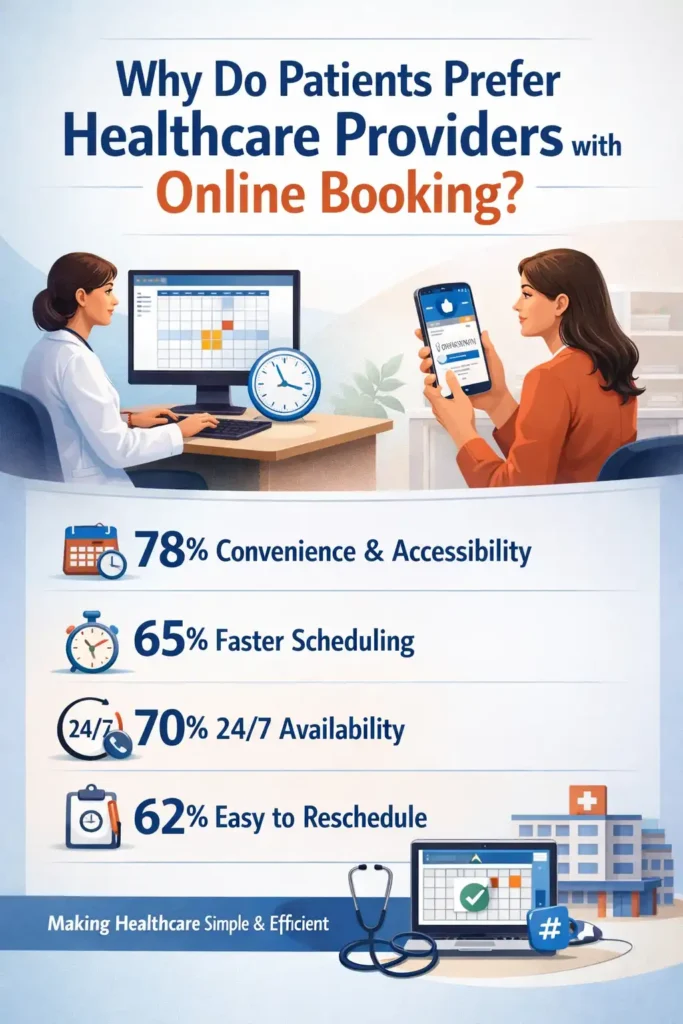
The Demand for Online Booking
Convenience is a top priority for today’s patients, with 70% of them preferring healthcare providers who offer online booking. This preference highlights the growing demand for digital solutions in the healthcare industry. Online booking systems not only make it easier for patients to schedule appointments but also reduce the administrative burden on your staff.
Implementing an online booking system can significantly enhance patient satisfaction and streamline your operations. Make sure your booking platform is user-friendly and integrates seamlessly with your existing systems to provide a smooth experience for your patients.
3. What Are Millennials’ Expectations for Digital Healthcare?
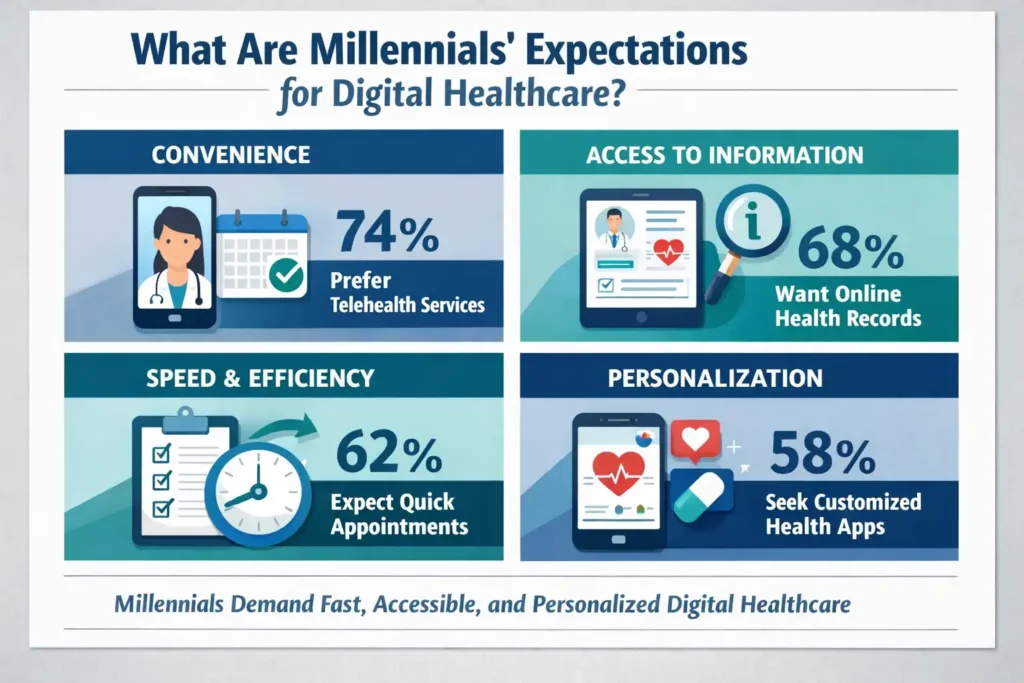
Millennials and Digital Healthcare Experiences
Millennials, who make up a significant portion of the patient population, have high expectations for digital healthcare experiences. About 60% of millennials expect a digital healthcare experience, which includes online booking, telehealth services, and mobile health applications. This demographic values convenience, accessibility, and quick access to healthcare information.
To meet these expectations, healthcare providers should invest in digital solutions that cater to millennials’ preferences. This could involve developing a mobile app for your practice, offering virtual consultations, and ensuring your website is mobile-friendly and easy to navigate.
4. How Much Will Healthcare Digital Ad Spending Increase in 2026?
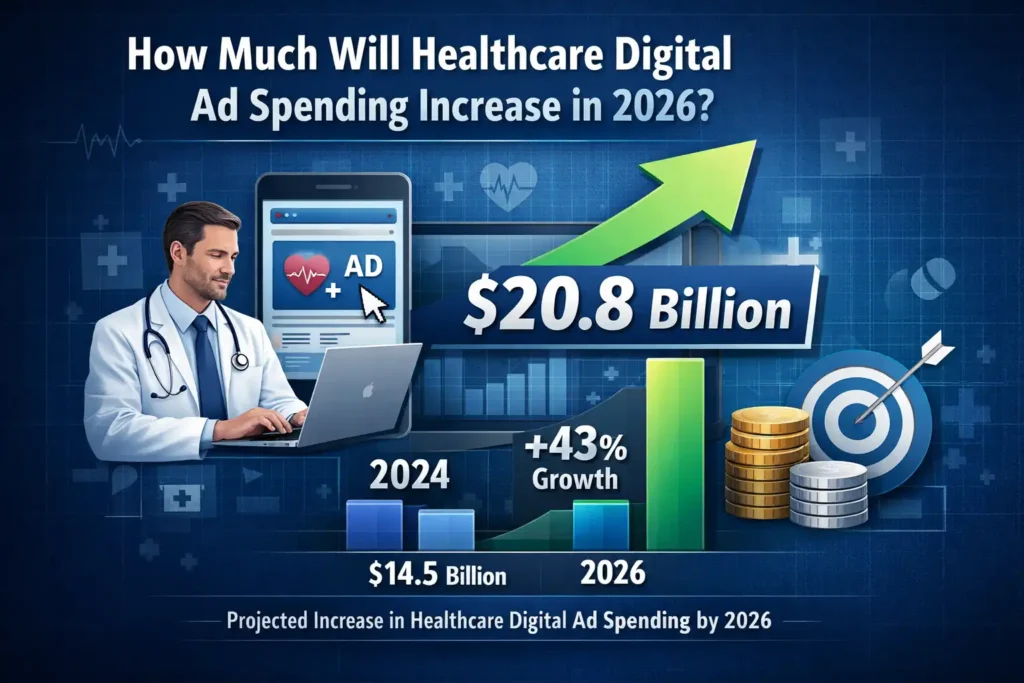
Growth in Digital Ad Spending
Investing in digital ads can help you reach a broader audience and target specific demographics effectively. Consider using platforms like Google Ads, social media ads, and programmatic advertising to maximize your reach and ROI.
5. How Popular Is Online Booking for Healthcare Appointments?
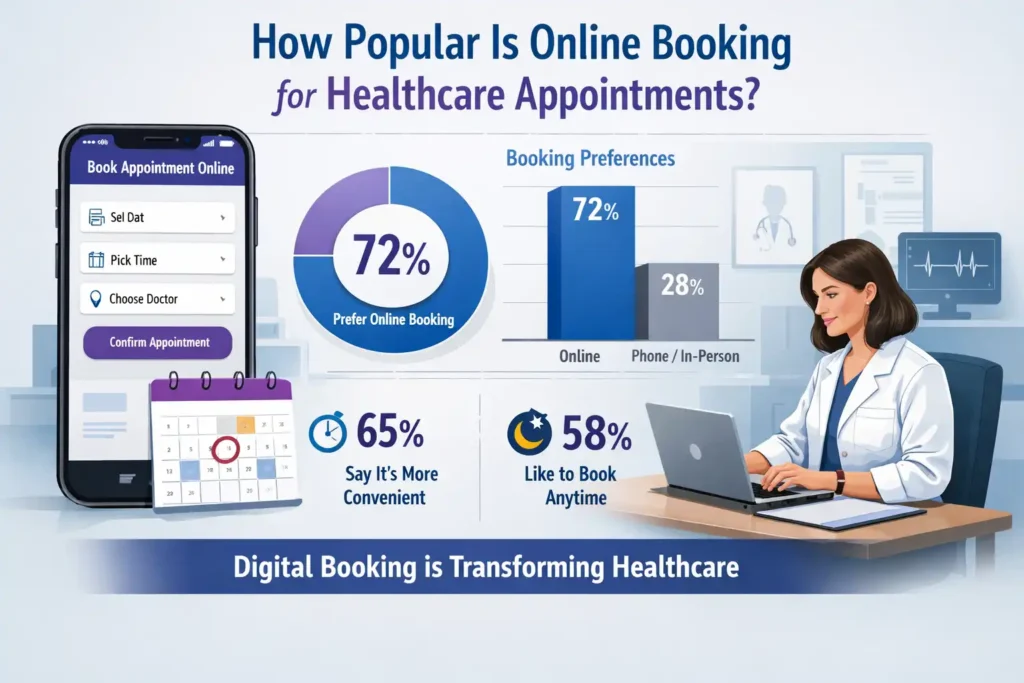
The Rise of Online Booking
Online booking has become increasingly popular, with 50% of healthcare appointments now being booked online. This shift towards digital scheduling is driven by the need for convenience and efficiency. Patients appreciate the ability to book appointments at any time without having to call during office hours.
To capitalize on this trend, ensure that your online booking system is prominently featured on your website and is easy to use. Providing clear instructions and confirmation emails can further enhance the patient experience and reduce no-show rates.
6. How Important Are Online Reviews in Choosing a New Doctor?
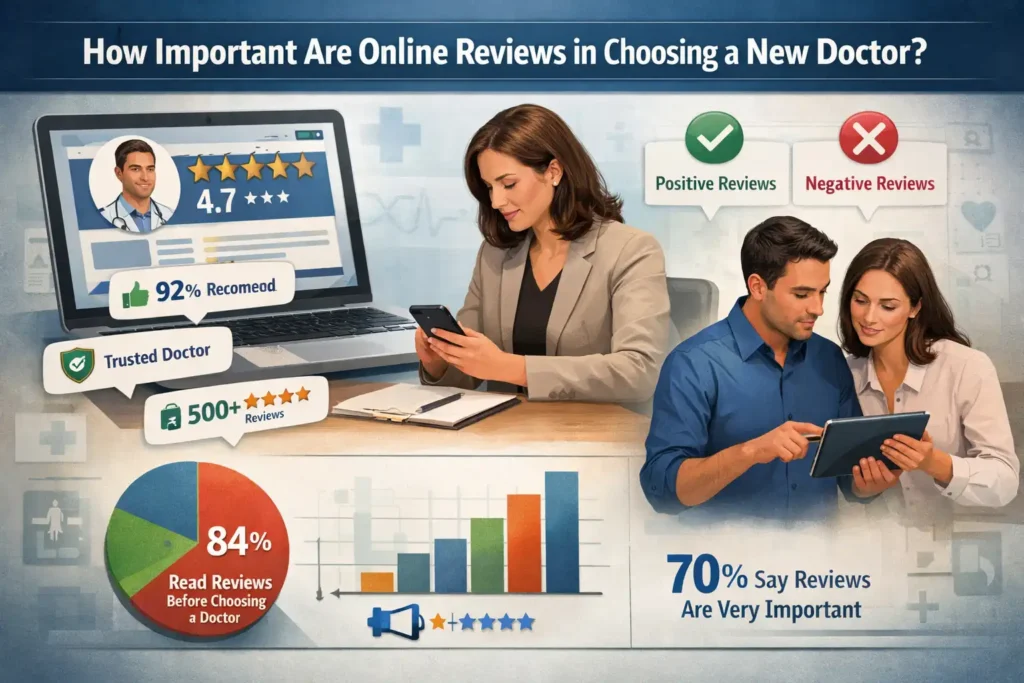
The Influence of Online Reviews
A substantial 77% of patients use online reviews as their first step in finding a new doctor. This statistic highlights the critical role that online reputation plays in healthcare marketing. Positive reviews can attract new patients, while negative reviews can deter them.
Encourage satisfied patients to leave reviews on platforms like Google, Yelp, and Healthgrades. Responding to reviews, both positive and negative, shows that you value patient feedback and are committed to providing excellent care.
7. How Often Do Patients Visit a Hospital’s Website Before Scheduling an Appointment?
The Role of Hospital Websites
Before scheduling an appointment, 83% of patients visit a hospital’s website. This statistic underscores the importance of having an informative and user-friendly website. Patients are looking for details about services, physician credentials, patient testimonials, and how to schedule an appointment.
Ensure your website is well-designed, easy to navigate, and provides all the necessary information patients might seek. High-quality content, including blog posts, FAQs, and video testimonials, can help build trust and guide patients towards booking an appointment.
8. What Is the Growth Rate of Telemedicine Usage?
The Expansion of Telemedicine
To leverage this growth, consider integrating telemedicine services into your practice. Promote these services on your website and through digital marketing campaigns to inform patients about the availability and benefits of virtual care.
9. How Have Healthcare Marketing Budgets Changed Recently?
Increases in Marketing Budgets
A significant 63% of healthcare marketers report that their marketing budget has increased in the past year. This increase reflects the growing recognition of the importance of effective marketing strategies in the healthcare sector. As competition intensifies, healthcare providers are investing more in marketing to attract and retain patients.
Consider allocating a larger portion of your budget to digital marketing, content creation, and patient engagement initiatives. By staying ahead of the curve, you can ensure your practice remains visible and competitive in the market.
10. What Are Patients’ Preferences Regarding Mobile Health Applications?

The Demand for Mobile Health Apps
A notable 54% of patients are more likely to choose a provider who uses mobile health applications. Mobile health apps offer convenience and accessibility, allowing patients to manage appointments, access medical records, and communicate with their providers directly from their smartphones.
Developing a mobile app for your practice can enhance patient engagement and satisfaction. Ensure the app is user-friendly and offers features that address common patient needs, such as appointment reminders, prescription refills, and secure messaging.
11. How Effective Is Content Marketing in Healthcare?
Lead Generation Through Content Marketing
Healthcare content marketing generates three times more leads than traditional marketing. This statistic underscores the effectiveness of providing valuable, informative content to attract and engage patients. Content marketing can include blog posts, articles, videos, infographics, and social media updates.
By creating high-quality content that addresses common health concerns and patient questions, you can establish your practice as a trusted authority in the field. This approach not only attracts new patients but also keeps existing patients engaged and informed.
12. What Type of Content Do Healthcare Consumers Prefer for Education?
Preference for Video Content
A significant 67% of healthcare consumers prefer video content for educational purposes. Videos are engaging, easy to digest, and can convey complex information in a clear and relatable way. This preference highlights the importance of incorporating video into your healthcare marketing strategy.
Consider creating educational videos that address common health issues, demonstrate procedures, or feature patient testimonials. Sharing these videos on your website, social media platforms, and YouTube can help you reach a wider audience and establish your practice as a reliable source of information.
13. How Common Is Social Media Use Among Healthcare Marketers?
The Prevalence of Social Media Marketing
A staggering 90% of healthcare marketers use social media to reach patients. Social media platforms like Facebook, Twitter, Instagram, and LinkedIn offer powerful tools for engaging with patients, sharing content, and promoting services. These platforms also allow for targeted advertising, helping you reach specific demographics effectively.
To maximize your social media efforts, create a content calendar that includes a mix of educational posts, patient stories, and updates about your practice. Engage with your audience by responding to comments and messages promptly, and consider using paid social media ads to boost your reach.
14. How Effective Is Email Marketing in Healthcare?
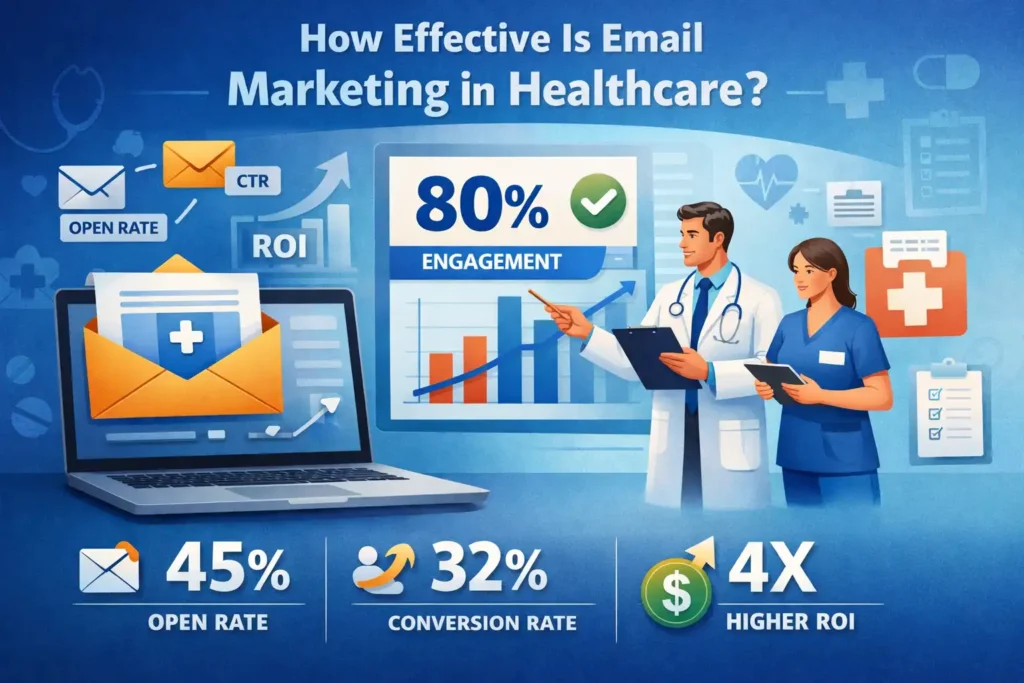
Higher Open Rates in Healthcare
Email marketing remains a valuable tool in healthcare, with a 30% higher open rate compared to other industries. This statistic underscores the effectiveness of email campaigns in reaching and engaging patients. Whether it’s sending appointment reminders, health tips, or newsletters, email provides a direct line of communication with your audience.
To enhance your email marketing efforts, segment your email list to send targeted messages based on patient preferences and behaviors. Personalize your emails to make them more relevant and engaging, and include clear calls-to-action to drive patient engagement.
15. How Does Online Information Influence Healthcare Choices?
The Impact of Online Information
A substantial 72% of healthcare consumers say that online information influences their choice of healthcare provider. This statistic highlights the critical role that digital content plays in patient decision-making. Patients rely on online reviews, provider profiles, and health information to make informed choices about their care.
Ensure that your online presence is robust and informative. Provide detailed information about your services, team, and patient experiences on your website. Maintain active profiles on healthcare review sites and encourage satisfied patients to leave positive reviews.

16. How Are Healthcare Organizations Adjusting Their Marketing Budgets for 2026?
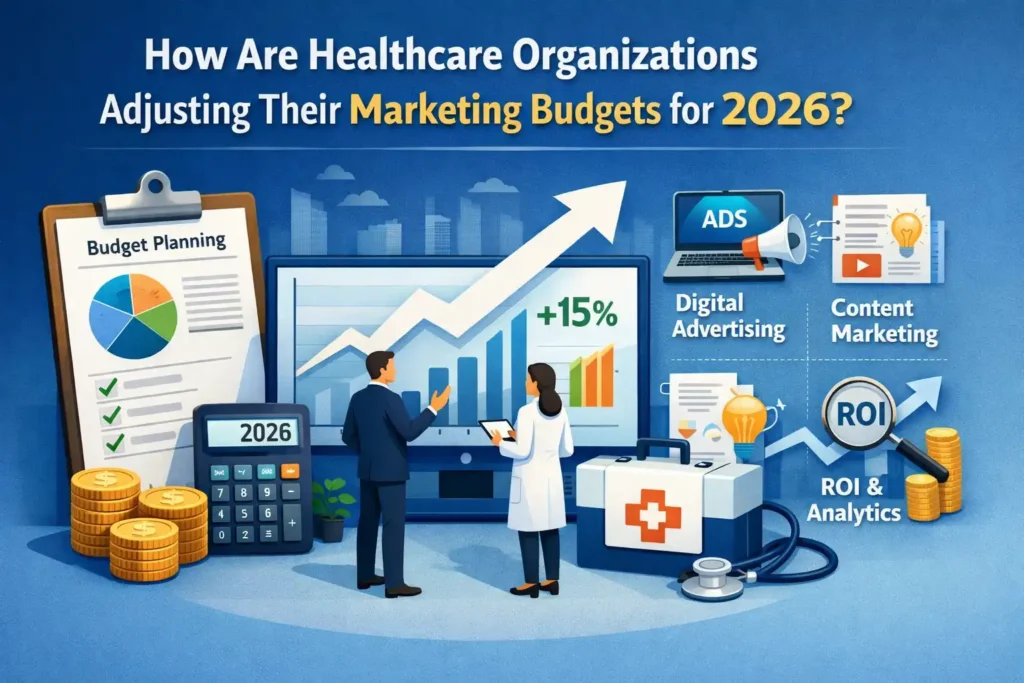
Increasing Digital Marketing Budgets
Consider increasing your investment in areas such as search engine optimization (SEO), content marketing, social media, and paid advertising. By enhancing your digital marketing efforts, you can attract more patients and improve your overall marketing ROI.
17. What Are Patients’ Preferences for Telehealth Services?
Telehealth as a Preferred Option
A notable 58% of patients prefer a provider who offers telehealth services. The convenience and accessibility of telehealth have made it a popular choice for patients, especially for follow-up appointments and non-urgent consultations.
To meet this demand, ensure that your practice offers telehealth options and promotes them on your website and through digital marketing campaigns. Educate your patients about the benefits of telehealth and how to access these services.
18. How Are Healthcare Marketers Using AI?
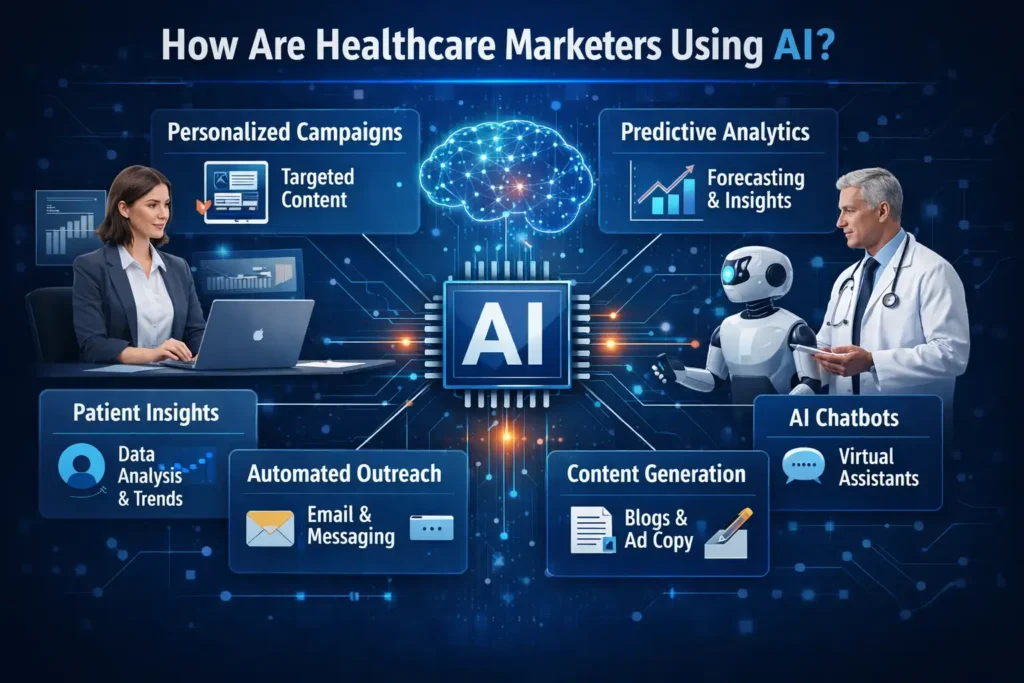
Personalizing Patient Engagement with AI
A growing trend in healthcare marketing is the use of artificial intelligence (AI), with 45% of healthcare marketers using AI to personalize patient engagement. AI can help analyze patient data to deliver personalized content, recommendations, and communications, enhancing the patient experience.
Implement AI-driven tools to improve your marketing efforts. For instance, chatbots can provide instant responses to patient inquiries, while predictive analytics can help tailor your marketing messages based on patient behavior and preferences.
19. What ROI Do Healthcare Marketers See from Digital Advertising?
ROI from Digital Advertising
A significant 92% of healthcare marketers find that digital advertising provides a good ROI. This statistic underscores the effectiveness of digital ads in reaching and converting potential patients. Digital advertising allows for precise targeting and tracking, ensuring that your marketing budget is used efficiently.
Invest in various digital advertising platforms such as Google Ads, Facebook Ads, and programmatic advertising. Track your campaigns closely to measure their performance and adjust your strategies to optimize results.
20. How Willing Are Patients to Switch Providers for Better Online Services?

Switching Providers for Better Online Services
A notable 78% of patients would switch healthcare providers for better online services. This statistic highlights the importance of offering robust digital solutions, such as online booking, telehealth, and patient portals, to retain and attract patients.
Ensure that your practice offers user-friendly online services and continuously improve them based on patient feedback. Promoting these features in your marketing efforts can help you attract patients who value convenience and digital accessibility.
21. How Do Healthcare Marketers Utilize Data Analytics?
The Role of Data Analytics
A significant 64% of healthcare marketers use data analytics to drive their marketing strategies. Data analytics allows marketers to gain insights into patient behavior, preferences, and engagement, enabling more informed decision-making and targeted marketing efforts.
Implementing data analytics tools can help you track the effectiveness of your marketing campaigns, identify trends, and optimize your strategies. By leveraging data, you can create more personalized and effective marketing initiatives that resonate with your audience.
22. How Trustworthy Are Online Reviews for Healthcare Consumers?
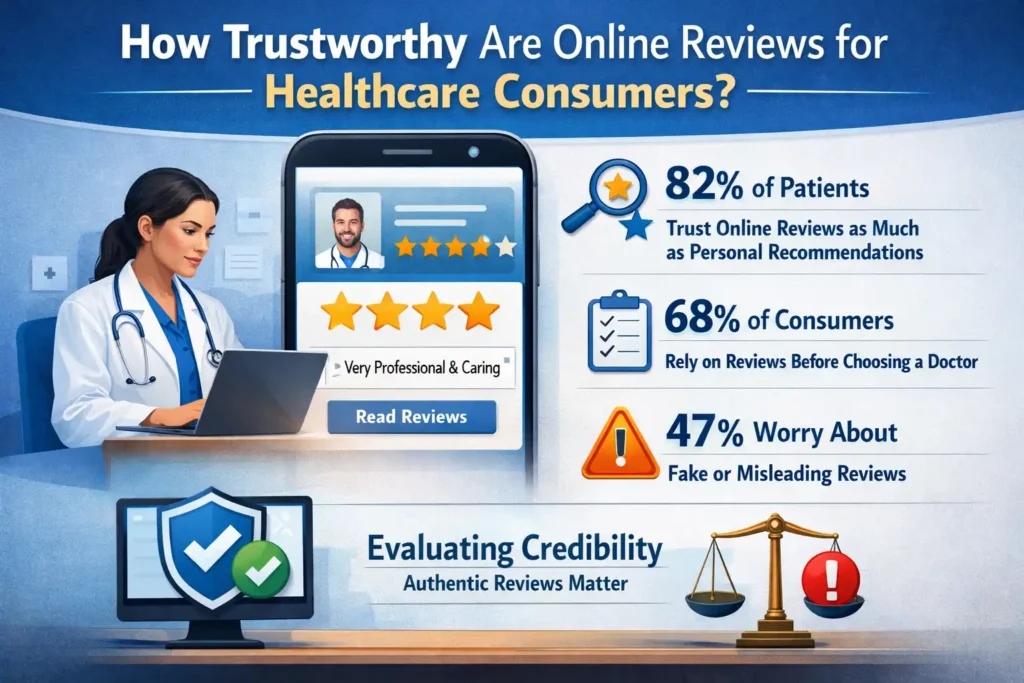
Trust in Online Reviews
An overwhelming 82% of patients trust online reviews as much as personal recommendations. This statistic underscores the importance of maintaining a positive online reputation. Patients rely heavily on reviews to choose healthcare providers, making it crucial to manage and respond to reviews effectively.
Encourage your satisfied patients to leave positive reviews and address any negative feedback promptly and professionally. Building a strong online reputation can enhance trust and attract more patients to your practice.
23. How Effective Is SEO for Lead Generation in Healthcare?
SEO’s Impact on Lead Generation
Healthcare SEO leads have a 14.6% close rate, compared to 1.7% for outbound leads. This statistic highlights the effectiveness of search engine optimization (SEO) in generating high-quality leads. SEO helps your website rank higher in search engine results, making it easier for patients to find you when searching for healthcare services.
Investing in SEO can significantly boost your online visibility and attract more potential patients. Focus on optimizing your website for relevant keywords, creating high-quality content, and building backlinks to improve your search engine rankings.
24. How Important Is a Strong Online Presence for Trustworthiness?
Building Trust with an Online Presence
A notable 55% of healthcare consumers say that a strong online presence is important for trustworthiness. This statistic underscores the need for healthcare providers to have a well-designed, informative, and active online presence.
Ensure that your website is professional, user-friendly, and provides comprehensive information about your services, team, and patient experiences. Active engagement on social media and maintaining updated profiles on review sites can further enhance your online credibility and trustworthiness.
25. How Prevalent Is Content Marketing Among Healthcare Organizations?
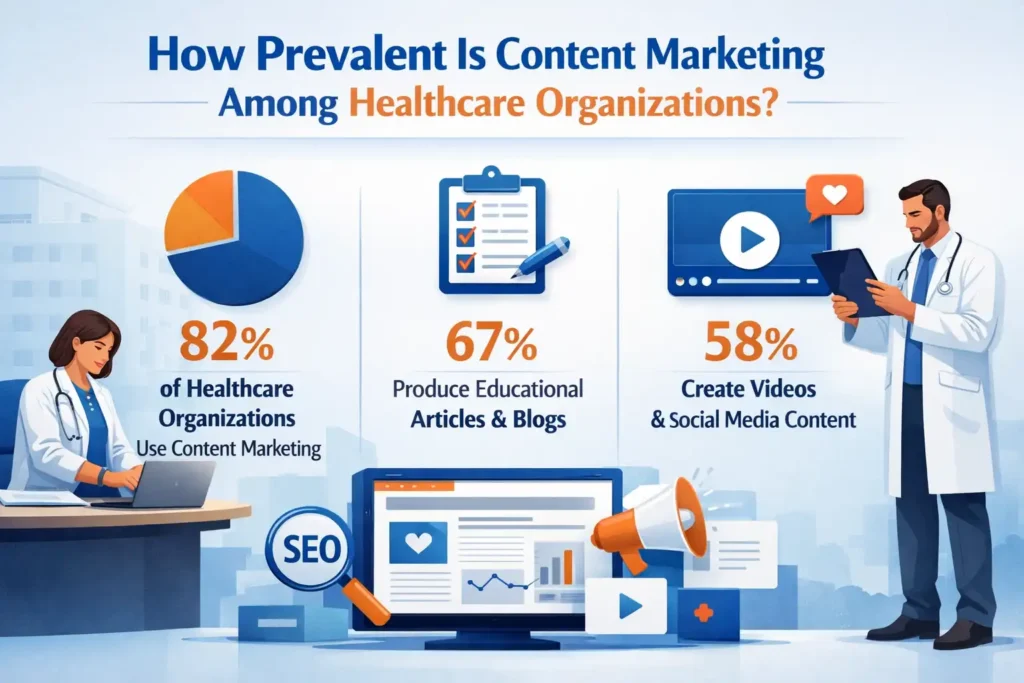
The Use of Content Marketing
A significant 60% of healthcare organizations use content marketing as a core strategy. Content marketing involves creating and sharing valuable content to attract and engage your target audience. This can include blog posts, articles, videos, infographics, and social media updates.
By providing informative and relevant content, you can establish your practice as a trusted authority in the healthcare field. Regularly updating your content and addressing common patient concerns can help you attract new patients and retain existing ones.
26. How Do Patients Engage with Online Health Videos?

Engagement with Health Videos
A substantial 76% of patients have watched online videos about health symptoms and treatments. This statistic highlights the growing preference for video content as a means of learning about health issues. Videos are engaging and can simplify complex medical information.
Create and share educational videos that address common health questions, demonstrate procedures, and provide health tips. These videos can be shared on your website, social media platforms, and YouTube to reach a broader audience and enhance patient engagement.
27. How Are Healthcare Providers Using Chatbots?
The Role of Chatbots in Healthcare
Half of healthcare providers use chatbots for patient interactions. Chatbots can provide instant responses to patient inquiries, schedule appointments, and offer information about services. This technology enhances patient experience by providing quick and convenient access to information.
Implementing chatbots on your website can improve patient satisfaction and reduce the workload on your staff. Ensure that your chatbot is programmed to handle common patient questions and can escalate more complex issues to a human representative when needed.
28. What Is the Importance of Online Patient Portals?
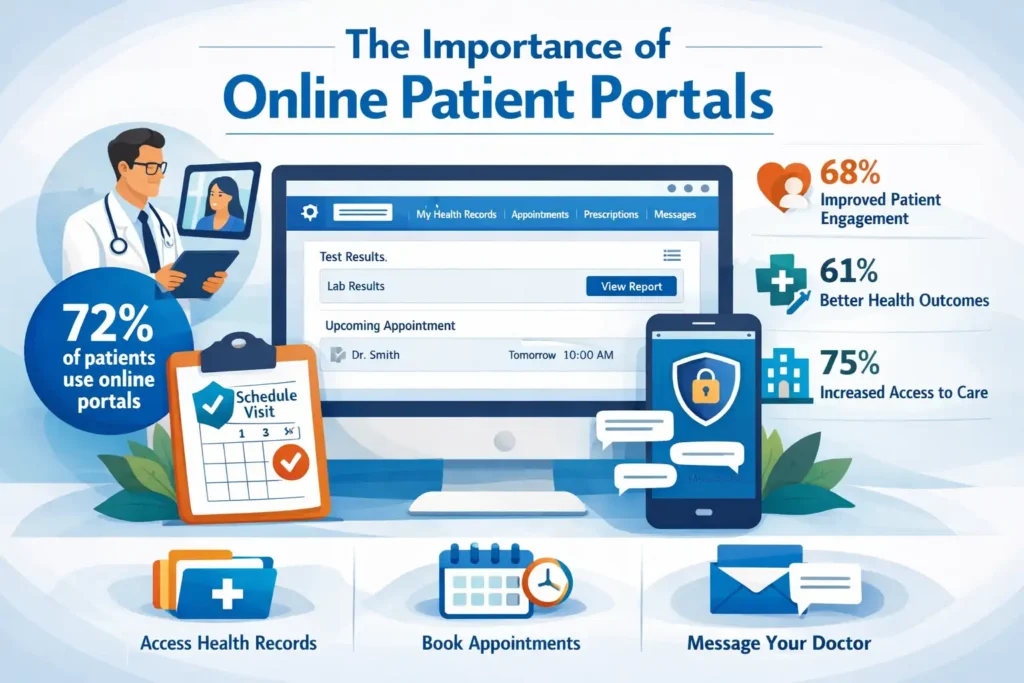
The Value of Patient Portals
A significant 68% of patients are more likely to choose a provider that offers an online patient portal. Patient portals provide easy access to health records, test results, and appointment scheduling, enhancing patient convenience and engagement.
Ensure that your practice offers a user-friendly patient portal and promotes its benefits to patients. Educate patients on how to use the portal effectively to manage their health information and communicate with your practice.
29. What Are Healthcare Marketers’ Plans for Augmented Reality (AR)?
Investing in Augmented Reality
Consider integrating AR into your marketing strategy to create unique and engaging experiences for your patients. AR can help differentiate your practice and provide innovative ways to educate and interact with your audience.
30. How Does Website Usability Affect Patient Decision-Making?
Influence of Website Usability
A significant 85% of healthcare consumers say that ease of use on a provider’s website influences their decision-making process. A user-friendly website that provides easy access to information and services can significantly enhance patient satisfaction and attract more patients to your practice.
Ensure that your website is well-designed, easy to navigate, and mobile-friendly. Provide clear information about your services, team, and how to schedule appointments. A positive online experience can make a strong impression and encourage patients to choose your practice.
Conclusion
Healthcare marketing is evolving rapidly, and staying ahead of the trends is essential for success. The statistics highlighted in this article provide valuable insights into the current state and future direction of healthcare marketing. By understanding these trends and implementing the strategies discussed, you can effectively reach and engage your target audience, enhance patient satisfaction, and drive growth for your practice.
We got all the latest Marketing Stats here:
Read Next
- Software Licensing Agreements: An International Perspective
- 19 Best Marketing Automation Tools for e-Commerce: A Deep Dive!
- How to Automate Lead Nurturing for your Business: A Deep Dive!
- Usability Testing for CRO: Upgrade Your User Experience!
- Multivariate Testing: The Ultimate Guide to Boost Your Conversions!




















Comments are closed.